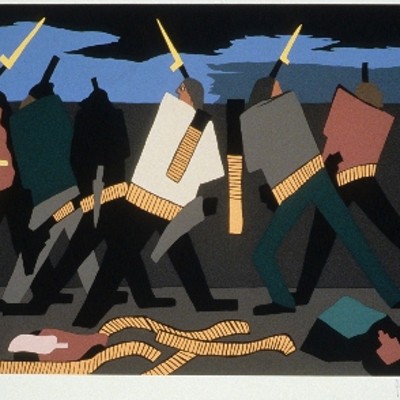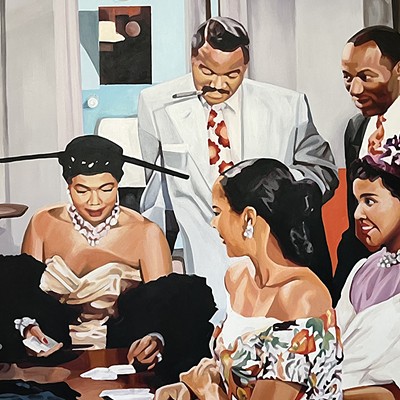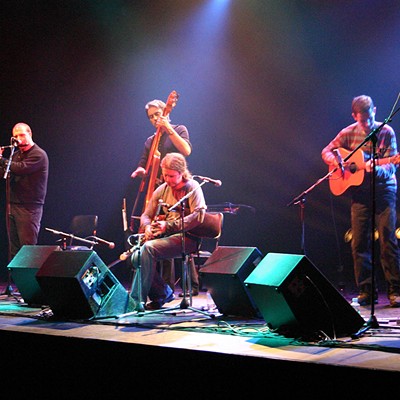A few years back, when Borderlands Theater was looking toward this year's 25th anniversary season, artistic director Barclay Goldsmith was trying to find a good play about immigration.
"For a long time, we wanted to do a play about people crossing the border," Goldsmith says.
The company had looked at plenty of dramas and even workshopped one, but nothing quite fit the bill. Goldsmith wanted a play about the migrants themselves, about the travelers who make the long, treacherous journey over the line and into the Arizona desert.
This weekend, Borderlands is opening a play that meets Goldsmith's specifications exactly. Arizona: No Roosters in the Desert is "the first thing we've ever done that gets at their voices," he says.
The reason? It's based on interviews with 130 migrant women. Written by playwright Kara Hartzler, Roosters draws on the scholarly fieldwork of Anna Ochoa O'Leary, a UA professor of Mexican-American studies.
A series of coincidences helped Goldsmith bring the scholar and the writer together. Ochoa O'Leary is a colleague of his wife, Raquel Rubio Goldsmith. And he had met Hartzler when Borderlands produced a play written by a friend of hers.
Not only is Hartzler a produced playwright with an MFA in playwriting; she's an immigration lawyer, with the Florence Immigrant and Refugee Rights Project, who works every day with migrant women being held at the federal detention centers in Florence and Eloy.
"It seemed like a good fit," Hartzler says, with considerable understatement. In 2008, Borderlands commissioned her to write the play.
Ochoa O'Leary provided Hartzler with stacks of typed-up interviews gleaned from a Fulbright research year in Nogales, Sonora. Over the course of nine months in 2006 and 2007, she traveled again and again to Albergue San Juan Bosco, a shelter up a hilly road a few miles south of the border. The migrants there had been caught in Arizona by la migra and quickly repatriated to Mexico.
"I wanted to find out what happens to women after they're apprehended by the Border Patrol," Ochoa O'Leary says. "My research was to get a better sense of what was really going on."
The stories she heard were heartrending. A woman to whom she gave the pseudonym Azucena was a 25-year-old from Guanajuato in central Mexico. Azucena had been trying to get to her husband in California, but somewhere in the Arizona desert, a Border Patrol helicopter "dusted" her group, swooping so low that the migrants thought "it might hit them," Ochoa O'Leary later wrote. The terrified travelers scattered. Azucena's mother-in-law fell and hurt her ankle, and in the confusion, Azucena lost her.
When Ochoa O'Leary met Azucena in the shelter the next day, the young woman was alone. She had no idea where her mother-in-law was, or what she should do next.
Rosita was just 18 when she made a winter crossing with her husband and infant child. The family from Michoacán successfully made it through the chilly wilderness, but the Border Patrol caught them in a drop house. Rosita had hoped to get to Oregon to join the parents she hadn't seen in 10 years. They'd left her behind as a child to go work in America, because, "A veces ni de comer teníamos," Rosita told Ochoa O'Leary. At times, we didn't have anything to eat.
The immigration of women is on the rise, Ochoa O'Leary found, in part because stricter border enforcement prevents husbands and fathers from returning home seasonally the way they used to. Many women have become "the sole support of their children," she says. "They were left, and they can't support their families. These individuals are highly motivated (to cross). They have whole families, and they're trying to find a way to support them."
Now that border enforcement is pushing migrants into ever-more-treacherous wilderness, women have a harder time keeping up, she says.
Playwright Hartzler drew on the real-life stories Ochoa O'Leary collected to create her fictional characters: four migrant women played by Annabelle Nunez, Anel Schmidt, Eva Zorrilla Tessler and Veronica del Cerro. These women have become separated from the group they started out with, and they're struggling to cross Arizona's prickly desert together.
"A lot of people start going through the desert, then because of injury or age, they can't keep going," Hartzler says. "Sometimes other people in the group stay with them, and sometimes they leave."
Those who remain with the injured out of compassion typically get arrested by the Border Patrol and sent back home, their own journeys a costly failure.
The moral dilemma faced by migrants in that situation—go or stay?—is the central drama of the play. Hartzler's four fictional women bond and tell stories and swear they'll stick together, but when one is injured, the other three must decide what to do.
"It's a universal theme," Hartzler says. "What would we do? When do you give up everything you're working toward and sacrifice yourself for someone else? I didn't want to use stereotypes, and portray migrants as innocent, blameless victims. They're human. Like anyone else, they're susceptible to human nature. I wanted to honor them by portraying them as well-rounded people."
The title, she says, refers to the biblical story of St. Peter betraying Jesus. Peter swore his loyalty to Jesus, but by the time the cock crowed on the morning of Good Friday, Peter had denied him three times.
The Tucson premiere actually marks the second full staging of the play. In what the company bills as a "rolling premiere," Roosters debuted at El Circulo Teatral in Mexico City in August, and it will open at Prop Theatre Group in Chicago next spring.
The collaboration between a playwright and an academic is unusual, but Ochoa O'Leary says she's "very pleased" with the play.
"It's not scholarly," she says. "It's not a history book, but it gives us pause to reflect."











